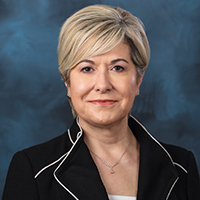Speaker Bios
Speakers are listed based on the order of presentation.

Frank Alexander is the Director for AI Strategy and Research with a National Security Focus at Argonne National Laboratory. Prior to that he was the Deputy Director of the Computational Science Initiative at Brookhaven National Laboratory from 2017-2023. Earlier, at Los Alamos National Laboratory he was the acting division leader of the Computer, Computational, and Statistical Sciences (CCS) Division. During his more than 20 years at Los Alamos, he held several leadership roles, including as deputy division leader of the CCS Division, Information Sciences Group Leader and leader of the Information Science and Technology Institute. Frank first joined Los Alamos in 1991 as a postdoctoral researcher at the Center for Nonlinear Studies. He returned to Los Alamos in 1998 after doing postdoctoral work at the Institute for Scientific Computing Research at DOE's Lawrence Livermore National Laboratory and serving as a research assistant professor at Boston University's Center for Computational Science. Frank's current research interests include artificial intelligence, machine learning, decision-making under uncertainty, optimal design of experiments, computational physics, and nonequilibrium physics. Frank has a PhD in Physics from Rutgers University and a B.S. degree in physics and mathematics from The Ohio State University. He has led many research projects including as PI of the ExaScale Computing Codesign Center for Machine Learning (ExaLearn) and has published more than 70 papers in peer reviewed venues. |

Ravi Madduri is a Computer Scientist in Data Science and Learning at Argonne National Laboratory and a Senior Scientist in the University of Chicago Consortium for Advanced Science and Engineering (UChicago CASE). Ravi Madduri is a computer scientist working in the intersection of HPC/AI and biomedicine. His research interests are in building sustainable, scalable services for science, reproducible research, large-scale data management, analysis using HPC and AI. He leads the PALISADE-X project that is developing Privacy-preserving Federated Learning framework to build robust, trust-worthy AI models. He co-leads the MVP-CHAMPION project, which is a collaboration between VA and DOE and develops methods to perform large-scale genetic data analysis using DOE's high performance computing capabilities, including methods for generating PRS scores in Prostate Cancer, genome-wide PheWAS on Summit supercomputer. Additionally, Ravi was one of three key contributors to the National Institutes of Health $100M Cancer Biomedical Informatics Grid (caBIG), which linked 60 NIH-funded cancer centers and clinical sites engaged in cancer research. For his efforts in project management, tool development, and collaboration, Ravi received several Outstanding Achievement Awards from NIH. For his work on “Cancer Moonshot” project, he received the Department of Energy Secretary award in 2017. |

Anuj J. Kapadia is a Distinguished Research Scientist and Section Head for Advanced Computing in Health Sciences at Oak Ridge National Lab (ORNL), and an Adjunct Professor of Radiology, Physics, and Medical Physics at Duke University. He holds a Ph.D. in Biomedical Engineering from Duke University. His work focuses on AI, ML, and simulation and modeling in health applications, particularly medical imaging, radiology, and radiation oncology. Dr. Kapadia has over 20 years of experience in neutron and X-ray scattering, Monte Carlo simulation development, and data analytics for security and medical applications. His work has been funded by the DOE, DOD, DHS, NIH, and the NC Biotech Center. His work has received acclaim in press articles, national and international conferences and he has won awards for his teaching, mentorship, and leadership roles. He has mentored 33 students and post-docs and has authored over 100 journal and conference papers. Dr. Kapadia is a member of the Institute for Electrical and Electronics Engineers, the Society for Photo-optical Instrumentation Engineers, and the American Association for Physicists in Medicine professional societies. |

Georgia (Gina) Tourassi is Associate Lab Director for Computing and Computational Sciences and the at the Oak Ridge National Lab (ORNL). In addition, she is an adjunct professor of radiology at Duke University and joint UT-ORNL faculty at the University of Tennessee at Knoxville and the Bredesen Center. She holds a PhD in Biomedical Engineering from Duke University and a BS in Physics from the University of Thessaloniki, Greece. Her scientific work is at the intersection of high-performance computing, artificial intelligence, and biomedicine. She is elected fellow of the American Institute of Medical and Biological Engineering (AIMBE), the American Association of Physicists in Medicine (AAPM), the International Society for Optics and Photonics (SPIE), the American Association for the Advancement of Sciences (AAAS), and the Institute of Electrical and Electronics Engineers (IEEE). Her scholarly work includes more than 250 peer-reviewed publications as well as 15 invention disclosures and patents. Gina received the Department of Energy (DOE) Secretary's Appreciation Award in 2016 for her leadership in the Joint Design of Advanced Computing Solutions for Cancer initiative, the UT-Battelle Distinguished Researcher Award in 2017, the DOE's Secretary Honors Award for her contributions to the COVID-19 Insights Partnership Team and to the COVID-19 HPC Resource Team in 2020, and the DOE's Secretary Honors Award for her contributions to the Congressional briefing series entitled “Driving U.S. Competitiveness & Innovation: A New Era of Science for Transformative Industry” in 2022. |
